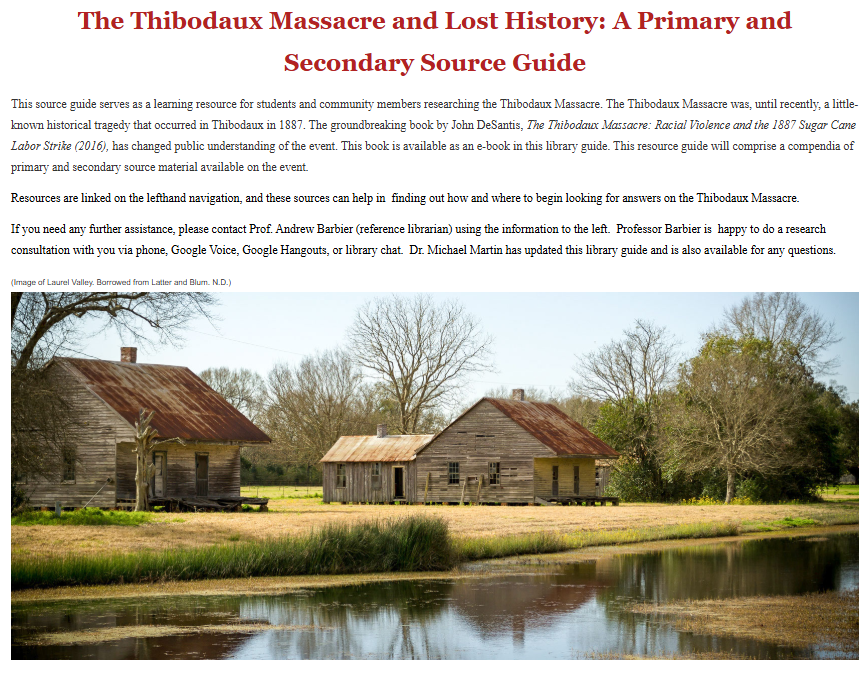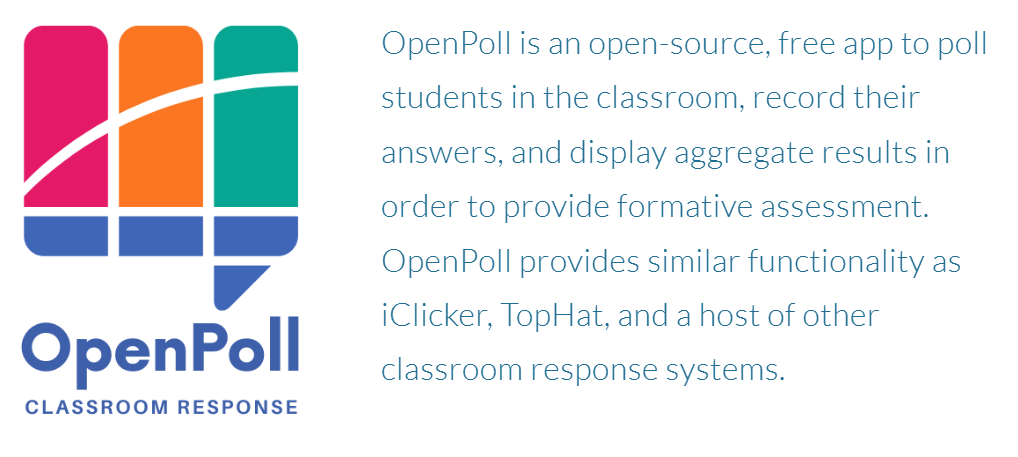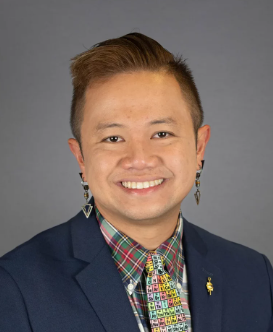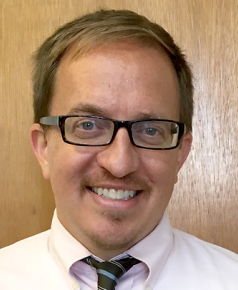
While registering, a student will certainly be aware of a $0 cost tag on a course. But they may not be aware that Open Educational Resources (OER) and Affordable Educational Resources (AER) are lowering the price tag, or that there are other benefits.
“Students are getting impacted by OER and don’t even realize it,” said Library Director Brandy Burbante. “Students will not only pay less in some cases, but they will also get more customized knowledge and skills than they would get from a commercial textbook.”
Government Information Librarian Jessica Hawkes added, “OER makes for a more tailored educational experience. So while they may not be aware of these incredible benefits, students will end up with a better educational experience as a result of it.”
In 2019, there was a big buzz about OER on Nicholls for textbook affordability. But between the pandemic and the hurricane, it somewhat fizzled out. Burbante was hoping to bring OER back to the forefront, and in 2023, she submitted a proposal to LOUIS: the Louisiana Library Network and Board of Regents for $40,000 to advance awareness and use of OER at Nicholls.
Once she knew she would be awarded at least some of the $40,000 (and ended up getting fully funded), Burbante contacted faculty to gauge interest in projects. And in the end, she settled on six projects to fund:
-
- English professor Dr. Michael Martin would develop materials for class related to the Thibodaux Massacre;
-
- Astronomy and Physics Professor Dr. Kaisa Young would create OER Workbooks for ASTR 101 & ASTR 102;
-
- Speech professor Dr. Anna Broussard would enhance an OER textbook and create a quiz bank for a speech course;
-
- Chemistry and Physical Sciences professors Dr. Glenn Lo and Dr. Chad Young would develop, evaluate and promote an open source classroom polling system;
-
- Psychology, Counseling, and Family Studies professor Dr. Chantrelle Varnado-Johnson would create an OER workbook to support a course in teletherapy crisis counseling;
-
- Chemistry Professor Dr. Theodore Alivio would create multimedia resources to support general education chemistry courses.

“This grant allowed us to give faculty extra incentive to put in the hard work to advance OER on our campus through these projects,” Burbante said.
And the project has the potential to return more savings to students per semester than the initial $40,000. At the time of publication, once all projects are complete, it has the potential to save Nicholls students taking these courses $57,932 per semester. Though Dr. Lo and Dr. Young’s project has the potential to increase these savings as more professors adopt their polling system.
Hawkes, who joined the library faculty in February 2024, was tasked as a project manager to help Burbante offer OER support. Thanks to the time and dedication of faculty devoted to OER, Ellender Memorial Library has been able to support faculty in the creation of the following OER resources and help to pass those benefits on to the students.
Spreading the Word About The Thibodaux Massacre

Dr. Michael Martin created a project that will not only be used in his English courses but hopefully by the greater Bayou Region community.
Martin created a subject guide that features information on the Thibodaux Massacre, as well as links to different resources on the subject that students and the community can use. The links use library resources, such as the definitive book on the subject by John DeSantis, which you would need to be a Nicholls student or faculty to see. In the spirit of open access, the guide also features useful links to freely accessible articles around the internet as well as YouTube videos.
“I want the guide to contribute to the understanding of race relations in southern history, southern Louisiana culture,” Martin said. “I want African-American history to be brought to the forefront, even something as dark as the Thibodaux Massacre.”
The Thibodaux Massacre took place in 1887. As a Smithsonian article, which Martin uses in his course, states, “On November 23, 1887, a mass shooting of African-American farm workers in Louisiana left some 60 dead. Bodies were dumped in unmarked graves while the white press cheered a victory against a fledgling black union. It was one of the bloodiest days in United States labor history, and while statues went up and public places were named for some of those involved, there is no marker of the Thibodaux Massacre.”
Utilized in his English 366 course, Advanced Expository Writing, the guide helps gather information on the subject in one place at students’ fingertips when they work on their project.
Since the Thibodaux Massacre is often a blind spot in history, Martin builds the project around spreading the word.
“And my thought would be for local students to find out something hidden, forgotten and tragic in local history and spread word about it,” he said. “One option is creating a website or a blog and sharing on social media. I want students to be interested in doing the research but also to spread the word.”
The guide also provides information to help students create their project such as Google hacks, citation help, and content creation resources.
For the community, Martin thinks the guide is also an important resource. Families can use the guide as they are doing their own research looking into relatives who were involved. Local scholars and historians can also use the guide to help them find resources to learn more about the subject.
Martin said the only real frustration in creating the guide is that students often want definitive answers, but because of bias in the newspapers at the time, that’s difficult.
“Many of the primary source documents on the massacre are anti Black,” he said. “Students want answers, but I can’t tell exactly how many people died or where the bodies are because of the way African-Americans were treated at the time.”
While definitive answers can’t be given for this type of research, Martin’s open access library guide can help people gain a better understanding on this important historical topic.
Making a Workbook to Better Suit Nicholls Astronomy Students

With Astronomy being a general education course, Dr. Kaisa Young wanted to keep the costs as low as possible. This started with an OpenStax textbook, but it hasn’t ended there, as she also sought to replace the $47 workbook. The workbook she was using didn’t completely fit her class, and there were not others on the market that would. Thus, she got the idea of developing one.
So, when she heard about the project from Burbante seeking faculty participants, Young knew it would help her complete the workbook. Over the course of a couple years, she would complete a prototype of two workbooks, one for ASTR 101 and ASTR102, pilot them over two semesters, then have a final ready by the end of the project.
She created the workbook by developing her own activities, as well as using existing OER activities and exercises. She also included a section for Fill in the Blank notes, to help students determine what is important to focus on during the class.
“A lot of the other activities are questions that review the content or see if they can apply what they learned in a different situation,” she said. “One that we just did in class, we were working on what is called a HR (Hertzsprung–Russell) diagram, which is a way to organize stars by how bright they are and their temperature. During the activity, students will get together in small groups, and they have to draw and label their own diagram.”
The pilot semester did help catch areas for improvements, which were relatively quick to fix as the course went along since the workbook is hosted on Pressbooks, a digital publishing & OER platform. The pilot also revealed students had different preferences. Many students wanted to look at the materials on their tablets or laptops while other students liked to print out the workbook and follow along with pen and paper.
“That is one thing that we are going to change, having some copies that are printed and bound that you can purchase at the bookstore,” she said. “It won’t be free anymore, but it will be for the cost of printing. There is a little bit of a learning curve to the online version and that can be frustrating for some students.”
Young says a big selling point for creating her own workbook is that she can tailor it 100% to her class.
“The workbook I was using could be frustrating because the price kept going up on it, and we were not using all of the material in it because it didn’t fit my class,” she said. “So while making a free resource was part of my goal for this project, another was putting together a workbook that would be more useful to my students.”
Her class isn’t completely OER, as there is still a component students have to buy, but Young says she hopes this can be an example for others.
“Even if your entire course material isn’t free, having one thing be OER can just reduce the cost for students, and students appreciate this,” she said. “I hope other faculty can see these projects around campus and decide to create their own projects.”
Creating a Quiz Bank to be Used by Speech Program

For many semesters, the speech courses have been using OER textbooks. One problem with that was the quiz banks no longer fit the textbook. But that was a solvable problem for Dr. Anna Broussard, who decided to create an OER quiz bank for the textbook.
As the project was beginning, though, Broussard was faced with a new problem. The OER textbook she had been creating the quiz bank for was going to be unpublished.
“I had started making the quiz bank over the Spring semester, and I found out in the summer that the book would be unpublished,” she said. “So I had to find an alternative that was similar to the original book. Luckily, I found one similar that was more streamlined than the original.”
The quiz bank was piloted in the Fall 2024 semester, and that resulted in some wording changes in questions that students were getting wrong.
The quizzes will be accessible to other Nicholls professors, and professors at other universities through Canvas Commons. Broussard designed the quizzes to evaluate how students are meeting the objectives she sets for them while reading the textbook. This allows her to focus more time in class on other objectives, like being comfortable with public speaking.
“I know my field, and I don’t usually teach out of a textbook anyway,” she said. “And for the old editions that might have useful information in them, I can highlight that in lectures.”
By teaching this way and using OER, she’s able to save students at least $100 on a textbook.
“I think this really should be the way of doing things,” she said. “College costs are already so expensive. And I dislike them having to pay 150 for the textbook, then add another expense for licenses for special programs to do online. I find that shady.”
Broussard said she hopes more faculty, not only at Nicholls but at colleges around the country, will end up using OER resources.
“I know it can’t do everything, as an OER book will not always be the best book for every subject,” she said. “But even then, there are ways to supplement other student expenses with OER resources that can be useful.
“I hope more people realize that this is an option, as new faculty may not know. This might really help out our students. We have a lot of first gen students who might not be able to afford all of the costs, which creates a barrier for entering college. This is a small way we can look at mitigating that barrier.”
Replacing the iClicker?

Not only have they provided a free alternative to the iClicker, but Drs. Glenn Lo and Chad Young also think it’s better.
OpenPoll is an app students can download on their phones and contribute to classroom polls, similar to the iClicker. Lo had been working on OpenPoll to use in his classroom when the call to submit to Burbante’s OER proposal came out, and Young thought it would help them develop the app for use in larger classrooms at Nicholls and potentially around the world.
“We’ve spent the past year troubleshooting it in our classes, adding and taking away features to get it where it is now,” Young said. “I think it has fewer issues than the iClicker and is better than what students pay $60 for.”
Lo piloted the product in his CHEM 303 class in the Fall 2024 semester.
“The pilot was generally smooth,” he said. “As expected, it resulted in the discovery and fixing of minor bugs and also resulted in some tweaks to make the product more polished and teacher-friendly. There were no issues on the student side.”
Young said the app is a basic tool for professors to use in the classroom to get feedback from students.
“Students also like getting real-time feedback. When they answer and if, as a class, they get above 70 percent, they get a joke,” he said. “They like that. But it also works the other way, if I ask a question and most of the students get it wrong, then I know I need to go back and revisit that material and address those deficiencies.”
Lo says he uses the program similarly in his class, and it is a good way to keep students engaged in the class. Also, he counts their OpenPoll participation as extra credit.
“I ask questions that are easy if they have been paying attention. I also ask tricky questions for which I let them discuss their answers with their classmates,” he said. “I emphasize to them that it is best that they learn about typical misconceptions in a low-stakes in-class extra-credit assessment rather than after a high-stakes exam.”
OpenPoll is a great tool for these types of assessments.
While it is being used by four Nicholls Chemistry professors, spreading the word to get the program to be used around Nicholls and around the world will be the next step, Young said. One thing that will help will be an upcoming paper they wrote that was accepted in the journal Physics Teacher.
“It’s a really great tool, but the hard part is to get other faculty to buy into it, and I understand it’s difficult to make a transition,” he said. “I think it is very important to provide accessible materials, low cost materials to help students.”
Another important feature of OER is that open education is constantly in development, said Young.
“Once a material is published, it can be fairly static, with no input from other people,” he said. “Open source allows for other people to come in and critique and edit it. I believe eventually you get something that is even better than what is published by a company that is doing it for a profit. The people who are coming in to edit are hopefully experts in the field.”
Preparing Crisis Prevention and Intervention Students for New Age

Since the pandemic, teletherapy, visiting with a therapist online, has become popular. Thus, Dr. Chantrelle Varnado-Johnson has begun advising graduate students on the technological requirements of the field including different online platforms.
This project has two parts: creating an OER workbook to replace a commercially available one and inviting students to do roleplay videos to further enhance the class. By having her students involved in the OER creation process, Varnado-Johnson is employing a teaching approach called “open pedagogy.”
“I am meeting CACREP reaccreditation requirements, assisting graduate students in obtaining micro-credentials in their Bayou Region, and lowering textbook costs by taking part in the OER project,” said Varnado-Johnson. “The importance of OER is to eradicate class conditioning when considering the needs of our student population. Instructors should remain cognizant of the social and economic issues that may plague the student. Thus, I think that using an open educational resource textbook instead of a commercial one and developing new supplementary materials improves the welfare of students.”
Varnado-Johnson says she faced some expected challenges with student volunteer fatigue, time constraints and faculty turnover, but that the project is going well. For the remainder of the Spring 2025 semester, she will be developing the interactive workbook to support the PSYC 523 Crisis Prevention and Intervention course.
“In my PSYC 523 course, I have been testing out OER project features at the moment. For example, I have invited students to collaborate on the open pedagogy project to enhance OER,” Vernado-Johnson said. “Further, I intend to survey graduate students studying counseling in the summer of 2025 to find out more about the effects of student textbooks and the caliber of the OER project. Plus, I am aiming to conduct a focus group too.”
Varnardo-Johnson’s completed interactive OER workbook will be published in Pressbooks.
Making Science Education More Affordable

Dr. Theodore Alivio is taking first steps into OER creation so students do not have to purchase a homework platform for access to interactive videos. This will also include an element of open pedagogy, as one aim of the project is to involve students in the video creation process.
Alivio is using an open education chemistry textbook, and plans to remix it in Pressbooks to incorporate the interactive videos using H5P programming, which is an open source language based on javascript.
The interactivity will include Fill in the Blank, long answers, and matching. Alivio is still looking for students to help with the recording but has created some lectures that can be included in the remixed Pressbooks textbook.
Ultimately, Alivio’s dream project would be to replace this expensive package that students currently purchase with an online platform where students can read the textbook, do the homework, and watch the interactive videos.
Open education is valuable in a variety of ways, including affordability.
“For example in our part of Louisiana, where many students are first generation, a lot of families benefit from OER because education is expensive,” Alivio said. “Having access to the basic materials for the class such as textbooks definitely helps students succeed.”
Another aspect that is useful about open education is being able to tailor the content.
“With open education resources, you can put in what you are interested in, what you believe students are interested in, for example, nanomaterials,” Alivio said.
Where Do We Go From Here?

Many of the projects have completed or are nearing their final stages. From here, Burbante and Hawkes will continue supporting Varnado-Johnson and Alivio on their projects, which have later deadlines.
For Fall 2024’s Convocation, the Library hosted a panel discussion featuring Hawkes, Dr. Kaisa Young, Business Law Professor Dr. Gene Gouaux, and Northwestern State University Library Director Dr. Megan Lowe.
“The panel highlighted both what is happening here at Nicholls and what is happening throughout the state,” Hawkes said. “After the panel we did get a lot of questions. So I thought it went great, and we helped faculty make connections with other faculty members that are working on open access projects.”
In the spring of 2026 during Open Education Week, the Library will host a reception to honor faculty who have worked on OER projects and helped advance open education at Nicholls.
“I’m planning to do some more intense promotion of OER and celebrate the OER work that we have been doing,” Burbante said. “Also, I will be applying for more funding, which I have already started doing, since funding is a barrier.”
Burbante applied for a second round of funding from LOUIS and the Board of Regents to advance OER projects, this time with a max funding of $15,000, which Nicholls was awarded in full. Projects that could potentially get funding in this round include Art, Communications and Culinary.
Burbante also wants to mention some projects that are happening without funding or funding separate from the library sources, including Dr. Lilah Landry in Biology making anatomy and physiology courses more affordable by authoring OER materials. Two nursing faculty, Dr. Alaina Daigle and Angele Davis, are also working on making their courses zero-cost with OER.
“Medical and nursing books are not the cheapest, and they change out a lot due to the nature of the field,” Burbante said. “Having OER there will be trendsetting. It will be the first of its kind on campus and hopefully others see the benefits of it.
“Making time for OER projects in between all of your various responsibilities can be a daunting task in the amount of time it takes,” Burbante said. But she thinks it can pay off for the students.
So does Michael Martin, who needed some swaying to come around to the potential of OER.
“At first, years ago, I was skeptical about OER, just in terms of the quality of the writing,” Martin said. “But now, I am very optimistic about OER and its ability to increase accessibility to a population who would not have access to books. So I think OER, if done correctly, has a lot of potential.”

